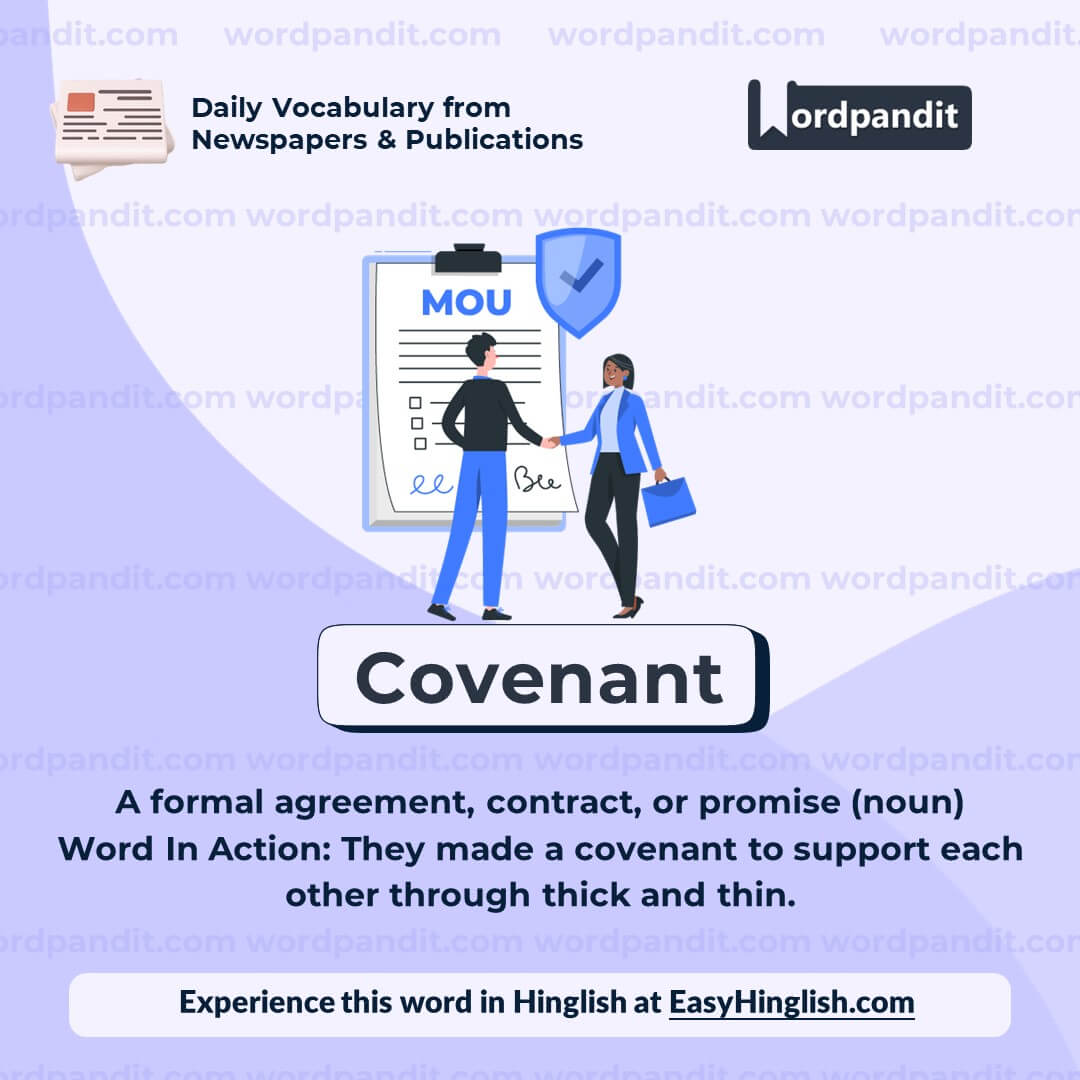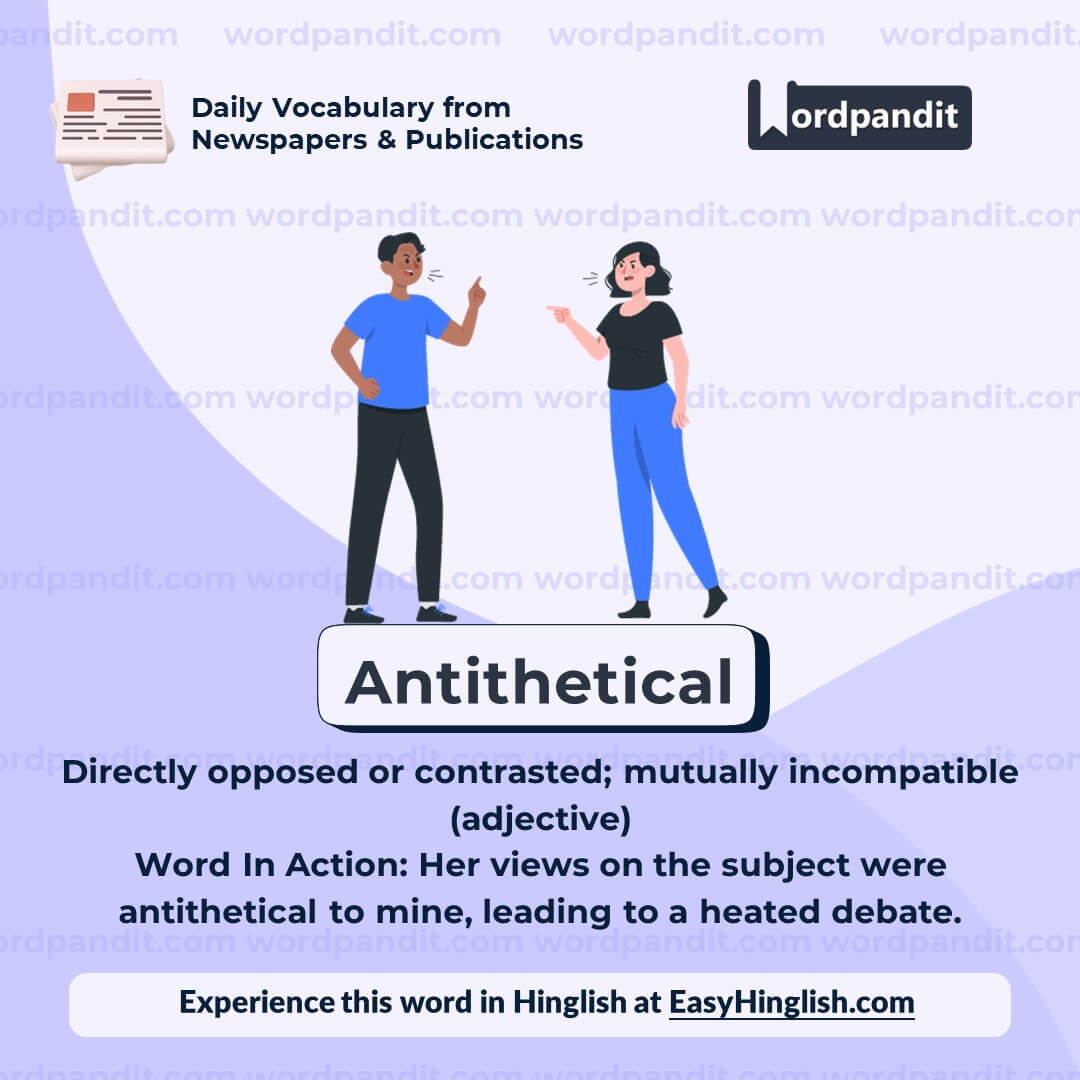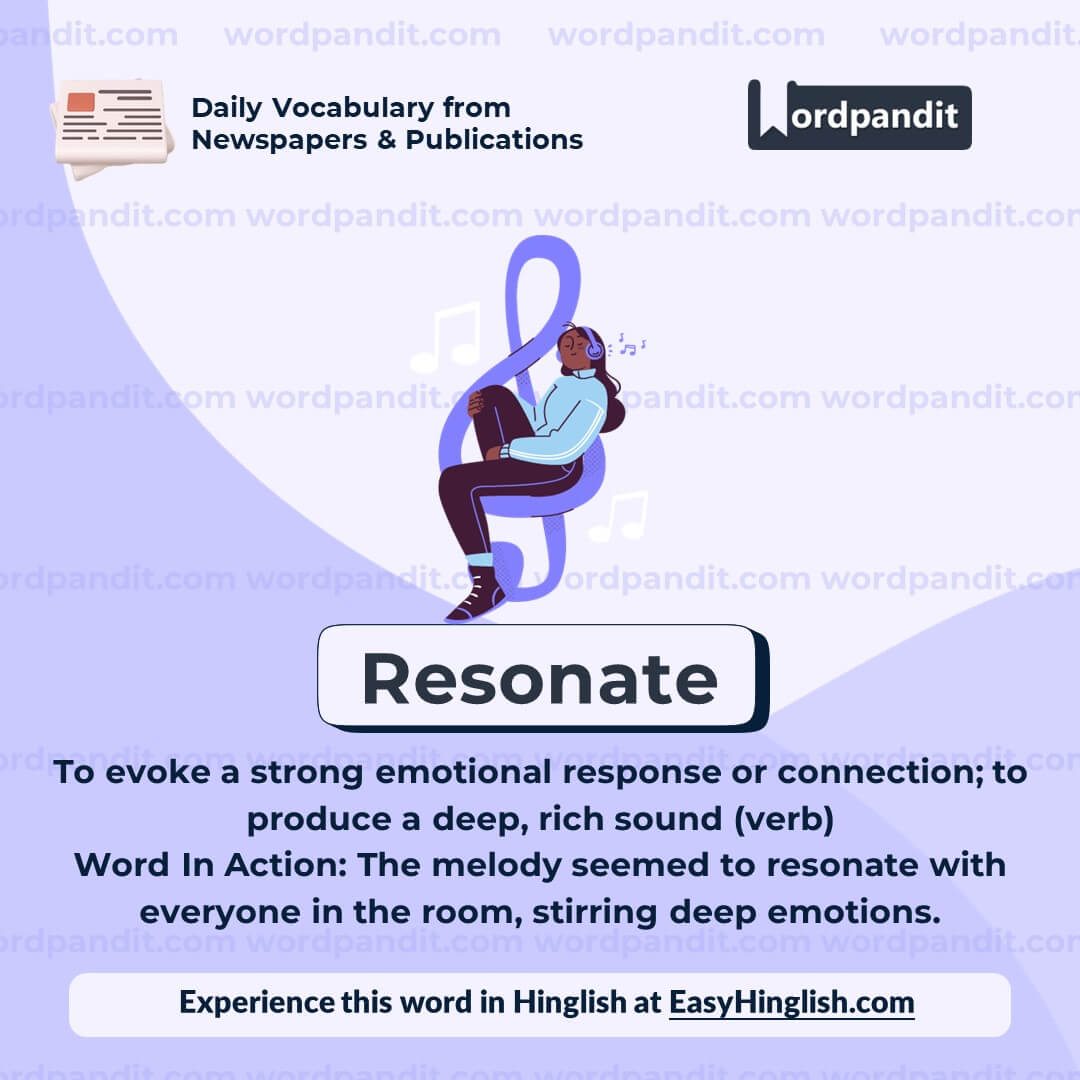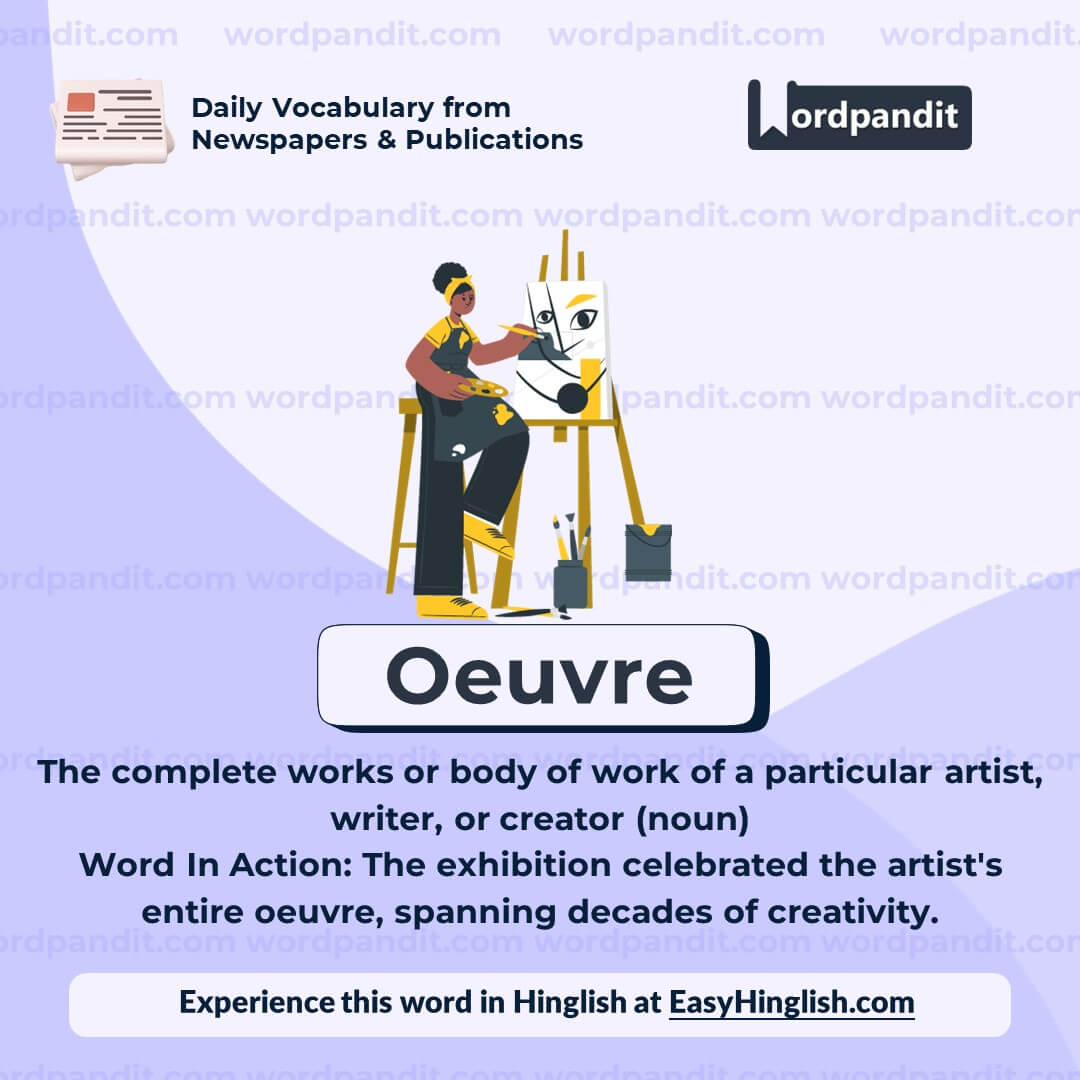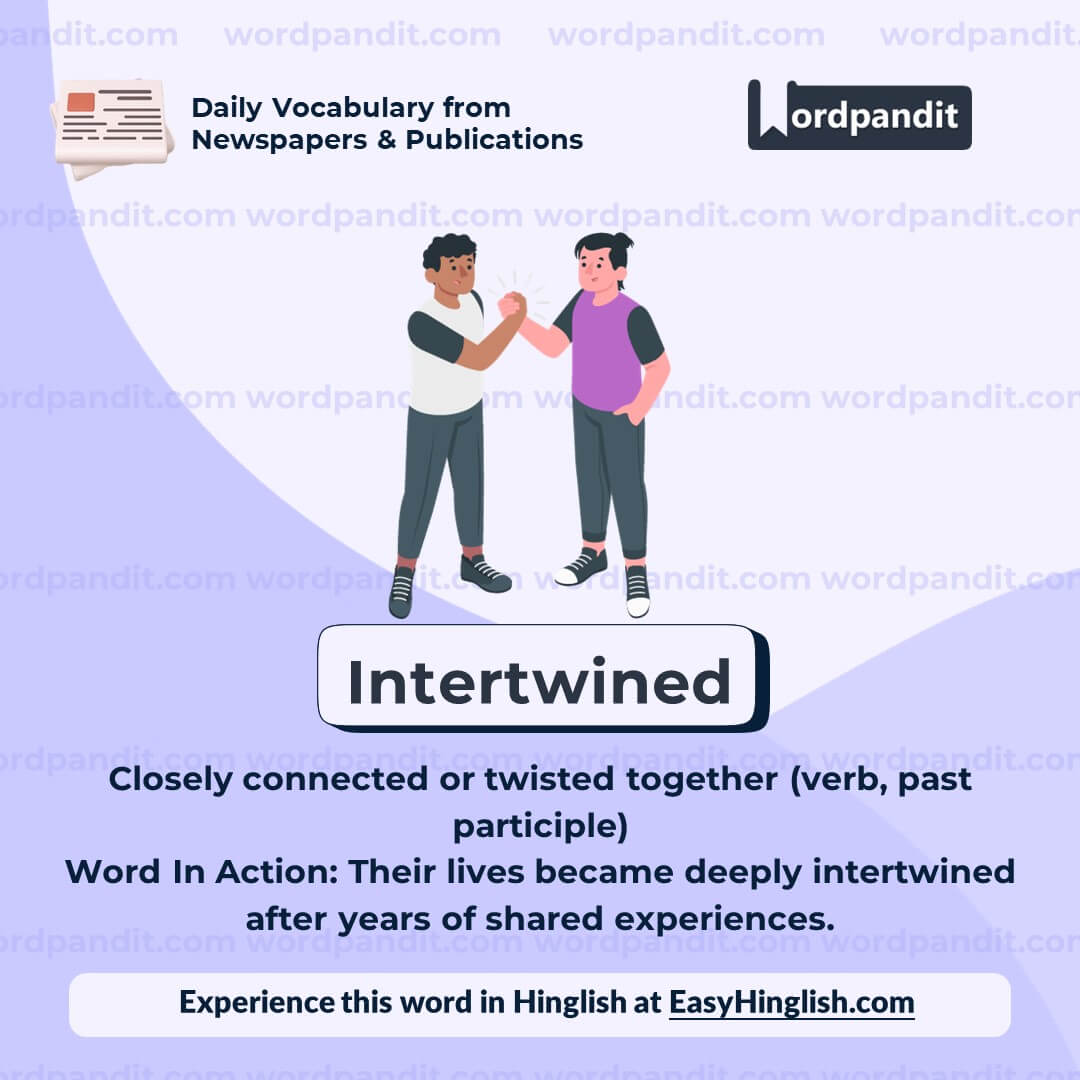Daily Vocabulary from International Newspapers and Publications
Expand Your Vocabulary with Wordpandit’s Global Vocabulary Hub
At Wordpandit, we are committed to helping you develop a truly global vocabulary by drawing from some of the most respected international publications. This section is designed to keep you ahead of the curve by introducing you to words that define global conversations and trends.
The Power of Global Sources
To help you think and communicate on a global scale, we curate vocabulary from renowned international sources, such as:
- The New York Times
- The Washington Post
- BBC
- The Guardian
- The Economist
- Scientific American
- Psychology Today
- And many more...
Stay Global, Stay Competitive
Our daily updates from international publications ensure you are consistently exposed to new words that reflect global news and developments, making sure your vocabulary is not only current but also globally relevant.
Enhance Your Global Perspective
Whether you’re preparing for international exams, aiming to excel in global business communication, or want to enhance your language skills for personal growth, Wordpandit offers the resources you need to thrive in a global context.
Effective Learning, Global Reach
Our learning methodology combines global examples, memory aids, and interactive activities, allowing you to internalize new words effectively and apply them in real-world scenarios.
Begin Your Global Vocabulary Journey Now!
Why Choose Wordpandit?
Practical Learning: Focus on words you'll actually encounter in real-world reading, enhancing your comprehension and communication skills.
Diverse Content: From current affairs to scientific breakthroughs, our varied sources expose you to vocabulary across multiple domains.
Effortless Integration: Make Wordpandit a part of your daily routine. Just a few minutes each day can significantly boost your lexicon over time.
Your Path to Vocabulary Mastery
- Visit our Daily Vocabulary section regularly
- Explore new words and their usage in context
- Practice incorporating these words into your own writing and speech
- Track your progress as your vocabulary expands
Start Your Journey Today
Embark on your vocabulary enhancement journey with Wordpandit. By consistently engaging with our daily posts, you'll build a robust vocabulary that serves you well in academic, professional, and personal contexts.
Remember, a word a day keeps linguistic limitations at bay. Make Wordpandit your daily companion in the quest for vocabulary excellence!
WORD-1: Covenant
Context:
"It was a nation, he wrote, ‘founded in experiment’, in which a covenant created a bond among individuals." - Aeon
Explanatory Paragraph:
The word "covenant" refers to a formal and binding agreement or promise, often used in legal, religious, or social contexts. It signifies a mutual commitment or understanding between parties to act according to agreed-upon terms. Historically, covenants have played a vital role in shaping societies and agreements, emphasizing trust and shared purpose.
Meaning: A formal agreement, contract, or promise (noun).
Pronunciation: KUH-vuh-nuhnt
Difficulty Level: ⭐⭐⭐ Intermediate
Etymology: From the Old French "covenant," derived from Latin "convenire," meaning "to come together, agree."
Synonyms & Antonyms:
Synonyms: Agreement, contract, pact, treaty, promise
Antonyms: Disagreement, discord, dispute
Usage Examples:
- The tribes formed a covenant to share resources during the harsh winter.
- The covenant between the two nations ensured years of peaceful coexistence.
- In their marriage vows, they entered into a covenant to support each other through life's challenges.
- The company's covenant with its employees guarantees fair wages and safe working conditions.
Cultural Reference:
"In the Bible, a covenant is a sacred agreement between God and His people, such as the one made with Abraham to bless his descendants." - Religious Studies Texts
Think About It:
How does the concept of a covenant differ from a simple agreement or contract? Consider its implications in moral, religious, and legal contexts.
Quick Activity:
Write a short paragraph imagining a modern-day covenant between citizens and their government. What would it include?
Memory Tip:
Remember "covenant" by associating it with the idea of "coming together" for a shared cause or agreement—think of "co" (together) and "venant" (agreement).
Real-World Application:
"Covenant" is used in legal agreements, such as rental or business contracts, where specific terms and commitments are outlined and agreed upon by both parties. It's also significant in discussions of historical and moral philosophies.
WORD-2: Antithetical
Context:
"The stage was set for a debate on antithetical positions: republicanism, rooted in the paradigm of civic humanism, reason and virtue, was contrasted with liberalism, defined by possessive individualism." - Aeon
Explanatory Paragraph:
"Antithetical" refers to something that is in direct opposition or complete contrast to something else. It is often used to describe ideas, beliefs, or positions that are fundamentally incompatible. In intellectual or philosophical debates, antithetical ideas are those that represent opposing principles or perspectives.
Meaning: Directly opposed or contrasted; mutually incompatible (adjective).
Pronunciation: an-tuh-THET-ih-kuhl
Difficulty Level: ⭐⭐⭐ Intermediate
Etymology: Derived from the Greek word "antithetikos," from "anti" (against) and "tithenai" (to place).
Synonyms & Antonyms:
Synonyms: Opposite, contradictory, conflicting, polar
Antonyms: Similar, compatible, harmonious
Usage Examples:
- His views on environmental conservation were antithetical to the company’s profit-driven policies.
- The novel presents antithetical characters, one embodying hope and the other despair.
- Democracy and dictatorship are often seen as antithetical forms of governance.
- Their relationship flourished despite their antithetical personalities.
Cultural Reference:
"The term 'antithetical' is central to the Hegelian dialectic, where the thesis and antithesis clash to create a synthesis, driving historical progress." - Philosophy Texts
Think About It:
Can two antithetical ideologies ever coexist peacefully, or is conflict inevitable? Provide examples from history or contemporary society.
Quick Activity:
List three pairs of antithetical ideas (e.g., freedom vs. control) and briefly explain why they are opposites.
Memory Tip:
Think of "anti" (against) and "thesis" (idea) to remember that "antithetical" describes ideas or positions that are in opposition to each other.
Real-World Application:
The concept of "antithetical" is widely used in literature, philosophy, and politics to analyze and explain opposing viewpoints. For instance, it is used to highlight the differences between capitalism and socialism or tradition and innovation in cultural studies.
WORD-3: Resonate
Context:
"Particularly with his last chapter, Pocock was successful at being provocative and fuelled a debate that resonated at historiographical, cultural and political levels." - Aeon
Explanatory Paragraph:
The word "resonate" refers to the ability to evoke or suggest strong emotions, ideas, or memories in someone. It can also mean to produce or be filled with a deep, full sound. In the context of ideas or discussions, something that resonates connects deeply with an audience or leaves a lasting impact.
Meaning: To evoke a strong emotional response or connection; to produce a deep, rich sound (verb).
Pronunciation: REZ-uh-nayt
Difficulty Level: ⭐⭐ Beginner
Etymology: From the Latin "resonare," meaning "to resound," derived from "re" (again) and "sonare" (to sound).
Synonyms & Antonyms:
Synonyms: Echo, reverberate, connect, strike a chord
Antonyms: Dull, dissonant, alienate
Usage Examples:
- The artist’s work resonated with viewers, sparking deep discussions about identity and culture.
- The sound of the church bell resonated through the valley, creating a sense of calm.
- Her speech resonated with the audience, as it reflected their shared struggles and hopes.
- The novel’s themes resonated with readers across generations.
Cultural Reference:
"Martin Luther King Jr.’s famous 'I Have a Dream' speech resonated with millions, becoming a cornerstone of the Civil Rights Movement." - History Archives
Think About It:
Why do some ideas, artworks, or messages resonate with certain audiences but not with others? Reflect on personal examples.
Quick Activity:
Think of a book, song, or movie that resonated deeply with you. Write a short paragraph explaining why it had such an impact.
Memory Tip:
Link "resonate" to the idea of "re-sound" or "echo," which helps to remember that it involves connection or reverberation, whether emotional or physical.
Real-World Application:
"Resonate" is often used in fields like literature, music, and public speaking to describe the power of certain works or messages to leave a strong impression. It is also applicable in branding, where companies aim to create advertisements that resonate with their target audience.
WORD-4: Oeuvre
Context:
"However, an interesting path (among many) into Pocock’s oeuvre involves looking at how his insights on historiography illuminate his work as a historian." - Aeon
Explanatory Paragraph:
The term "oeuvre" refers to the complete body of work produced by an artist, writer, or creator over their lifetime. It emphasizes the collective achievements and output of an individual in their field, often used to analyze or appreciate the full scope of their contributions to art, literature, or other disciplines.
Meaning: The complete works or body of work of a particular artist, writer, or creator (noun).
Pronunciation: UR-vruh
Difficulty Level: ⭐⭐⭐ Intermediate
Etymology: Borrowed from French, meaning "work," derived from the Latin "opera," which also means "work."
Synonyms & Antonyms:
Synonyms: Body of work, corpus, collection, portfolio
Antonyms: Fragment, piece, portion
Usage Examples:
- The director’s oeuvre includes some of the most critically acclaimed films of the 21st century.
- Her oeuvre spans several genres, showcasing her versatility as a writer.
- The museum hosted an exhibition celebrating the entire oeuvre of the renowned sculptor.
- Scholars continue to explore the oeuvre of Shakespeare for fresh interpretations of his plays and sonnets.
Cultural Reference:
"Picasso’s oeuvre, encompassing thousands of paintings, drawings, and sculptures, defines the evolution of modern art." - Art History Books
Think About It:
How does analyzing an artist’s oeuvre provide a deeper understanding of their growth, influences, and legacy?
Quick Activity:
Choose a favorite artist or writer. List three works from their oeuvre and describe how these works showcase their style or evolution.
Memory Tip:
Link "oeuvre" to "opera" (a work or collection of works) and think of a complete gallery of someone's lifetime achievements.
Real-World Application:
"Oeuvre" is used in literary and artistic critiques, reviews, and academic discussions to assess an individual’s entire body of work. For example, film critics often examine a director’s oeuvre to understand their recurring themes and stylistic choices.
WORD-5: Intertwined
Context:
"Time, politics and context were intricately intertwined categories. How people understand their pasts, and the history of how they write about their pasts, have political implications and determine." - Aeon
Explanatory Paragraph:
The word "intertwined" describes two or more things that are closely connected or woven together in a way that makes them inseparable. It is often used figuratively to convey the deep interrelation between concepts, events, or elements, such as history and politics, or time and culture, as mentioned in the context.
Meaning: Closely connected or twisted together (verb, past participle).
Pronunciation: in-ter-TWYND
Difficulty Level: ⭐⭐ Beginner
Etymology: From the Middle English "entwinen," combining "inter" (between) and "twine" (to twist).
Synonyms & Antonyms:
Synonyms: Interwoven, connected, braided, entangled
Antonyms: Separated, detached, untangled
Usage Examples:
- The themes of love and loss are intricately intertwined throughout the novel.
- In a forest ecosystem, the lives of plants and animals are deeply intertwined.
- Their destinies became intertwined after they started working on the same project.
- The histories of the two neighboring countries are so intertwined that separating their narratives is almost impossible.
Cultural Reference:
"In Greek mythology, the fates of mortals and gods are often portrayed as intertwined, highlighting the interdependency of their actions and destinies." - Mythology Studies
Think About It:
Can you think of any examples where history and culture are so intertwined that it’s difficult to separate them? Why do you think this is the case?
Quick Activity:
Choose two related concepts (e.g., technology and education) and write a short explanation of how they are intertwined in today’s world.
Memory Tip:
Picture two vines growing together, their branches intertwined, to remember the word's association with deep connections or interrelations.
Real-World Application:
"Intertwined" is frequently used in fields like history, politics, and sociology to describe the deep and often complex relationships between different forces, events, or concepts. It is also common in literature to describe tightly woven storylines or character relationships.


